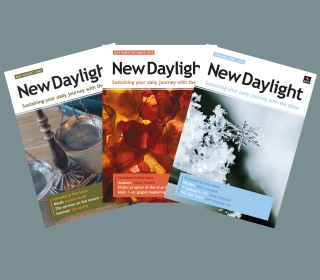In the first of a series of summer articles drawn from our Bible reading notes, New Daylight writer Tim Heaton looks at summer ‘through a Christian lens.’
13 August 2023
Summer through a Christian lens
The eye of faith sees God in everything. So summer is not just something that we experience, an astronomical phenomenon that simply ‘happens’. God is present in summer just as God is present in everything, because God made it and made it for a purpose.
All things in heaven and on earth, visible and invisible, were created in Christ and by Christ, through Christ and for Christ, as the great hymn of Colossians 1:15–20 tells us. Or, as John the Evangelist would later encapsulate it: ‘All things came into being through him, and without him not one thing came into being’ (John 1:3).
So let’s look out for signs of God’s presence and his holy hand at work as we explore the theme of summer through a Christian lens.
In the natural world, summer is the season of growth – the abundant and generous growth of grain, vegetables, flowers and summer fruits. In the UK the growing season is short: only four months can be guaranteed frost-free, perhaps even less in the far north. Much of our food is grown in this small window of opportunity, not only on farms but also in countless gardens and allotments.
‘God is present in summer just as God is present in everything, because God made it and made it for a purpose.’
Modern freezing and canning techniques mean it can now be stored and supplied all year round, which of course wasn’t the case in biblical times when fewer and less effective preserving methods existed. Famine was never far away.
The promise of summer
‘From the fig tree learn its lesson: as soon as its branch becomes tender and puts forth its leaves, you know that summer is near. So also, when you see these things taking place, you know that he is near, at the very gates. Truly I tell you, this generation will not pass away until all these things have taken place. Heaven and earth will pass away, but my words will not pass away.’
Mark 13:28–31
The fig tree is indigenous to the eastern Mediterranean region, where its bud burst heralds the approach of summer. If I had to name a harbinger of summer in the UK, I suppose it would be our native hawthorn, also known as the may tree, an ancient symbol of new life, fertility and rebirth, whose branches blossom in spring and were once woven into May Day crowns. Shakespeare’s ‘darling buds of May’ of Sonnet 18 (‘Shall I compare thee to a summer’s day?’), might refer to the hawthorn rather than to the month.
The Palestine of Jesus’ time was an agrarian society and the images he used often sprang from the natural world around him. Figs, grapes and olives were widely cultivated, and they inspired many parables and proverbs. As well as its eponymous fruit, the Mount of Olives was famous for its fig trees, which sometimes attained a height of 30 feet. When the fig tree becomes green, one can be certain not only that summer is coming but also that it is near.
Jesus draws a parallel here to his return. ‘These things taking place’ (v. 29) refers to the ‘desolating sacrilege’ (i.e. the desecration of the temple) and the subsequent end-time turmoil of verses 14–23, and Jesus reassures his hearers, ‘I will be near.’
Just as the leafing of the fig tree is a sure sign of the proximity of summer, so ‘these things taking place’ will signal that the day of salvation is near. This is about certainty as well as imminence.
Contemporary society seems to be less sure about God’s promises than it used to be, but from the fig tree can learn its lesson.
‘When the fig tree becomes green, one can be certain not only that summer is coming but also that it is near.’
Summer harvest
Jesus also said:
‘The kingdom of God is as if someone would scatter seed on the ground, and would sleep and rise night and day, and the seed would sprout and grow, he does not know how. The earth produces of itself, first the stalk, then the head, then the full grain in the head. But when the grain is ripe, at once he goes in with his sickle, because the harvest has come.’
Mark 4:26–29
Spring is seedtime; summer is harvest. I was raised in a small village surrounded by enormous fields of wheat and barley, and when I was a teenager, during the summer holidays I would help to bring in the harvest, mostly doing the mundane work of loading bales of straw on to trailers and unloading them in a barn. Come August, the sight of giant machines working in these fields of gold all over the countryside will be for many the typical image of modern harvest.
The parable of the growing seed highlights the miracle of nature contained within such a tiny organism. It is truly miraculous (from the Latin miraculum, an ‘object of wonder’) that something apparently so lifeless and inert can sprout and grow. All it needs is warm earth, light and moisture.
The Swedish botanist Carl Linnaeus once said, ‘Find wonder in everything, even the most commonplace,’ and the germination of a seed is certainly something to marvel at.
‘Find wonder in everything, even the most commonplace’ —Carl Linnaeus
The strangely passive sower and reaper in the parable is God. We are told that human actions can neither hasten nor delay the coming of the kingdom. The kingdom will come because that is God’s plan and purpose. Like the harvest, which stems from next-to-invisible beginnings, it is certain; God will see to that.
Yet the apparent lack of any human agency during the process does not mean we can sit back and do nothing and leave it all to God. God works through people, and we are called to be kingdom-growers so that others may have life. And if our testimony to the gospel may at times appear insignificant or even fruitless, we should never be discouraged and never give up.
Scripture quotations are taken from the New Revised Standard Version Updated Edition. Copyright © 2021 National Council of Churches of Christ in the United States of America. Used by permission. All rights reserved worldwide.

Tim Heaton is a parish priest and rural dean of Blackmore Vale in the diocese of Salisbury. He is the author of the best-selling Lent course The Long Road to Heaven (Circle Books, 2013). You can connect with him at facebook.com/lentcourses.

New Daylight is our most popular series of Bible reading notes and is for everyone on their daily journey with God. Each issue provides four months of daily Bible readings and comment, with a regular team of contributors drawn from a range of church backgrounds. New Daylight covers a varied selection of Old and New Testament passages, biblical themes, characters and seasonal readings.

A summer break
Today, and for the next two weeks, our news and events column is going to be shorter than usual as a number of staff and contributors take a well-earned summer break. We hope you’ll be able to enjoy a break too, whether at home or away, and whatever the weather in your part of the world happens to be. But if you need anything from us during the holiday season, be assured that our supporter services team will still be on hand to answer any enquiries, purchases and donations. Email them at enquiries@brf.org.uk or phone +44 1865 319700. Explore our wide range of resources at brfonline.org.uk.
We’ll be back with our usual rich mix of resources and events on 3 September.
